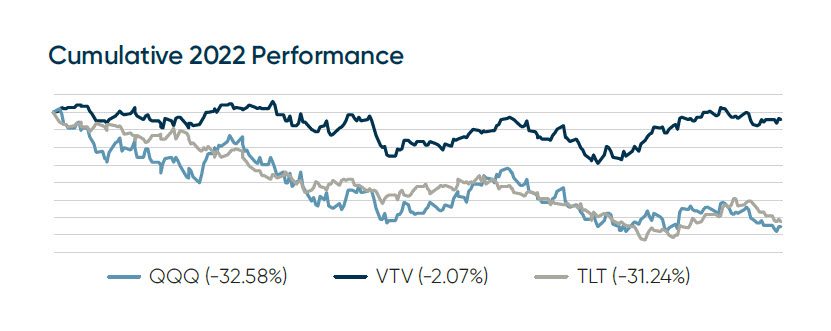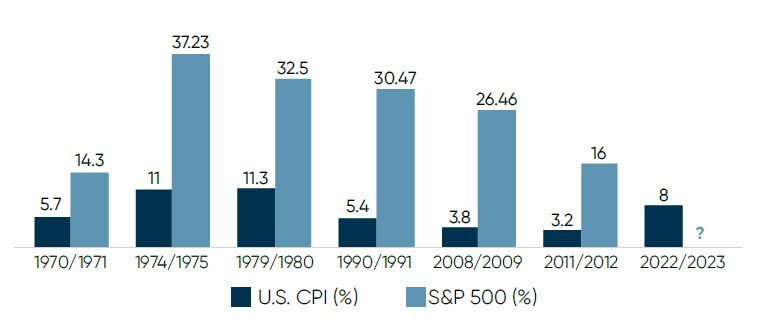Rate hikes stifle growth stocks
A year-end review shows that Interest rate hikes exerted downward pressure on growth stocks while value stocks mostly held their own.
Because of their often meager current cash flows, the price of growth stocks usually discounts earnings that the market anticipates will occur in the distant future. As a result, a parallel can be drawn to a certain extent with their performance and that of long bonds. They are therefore highly vulnerable to the interest-rate spikes that ordinarily accompany inflationary surges.

Data in USD. Performance excluding distributions from January 1 to
December 31, 2022. Source: MorningStar.
QQQ: Invesco QQQ Trust
Nasdaq 100 Index ETF
VTV: Vanguard Value Index Fund ETF
TLT: iShares 20+ Year Treasury Bond ETF
The pricing power of value stocks
The pricing power they enjoy tends to favour value stocks in times of high inflation.
They are generally able to maintain their profit margins despite the challenges posed by increasing input costs. Companies that boast a competitive advantage and a strong economic moat can keep pace with spiralling expenses by raising their own prices.
Would declining rates bolster growth stocks?
If rising interest rates hurt growth stocks, would a reversal benefit them?
While value stocks have historically outperformed them during inflationary periods, their potential to outpace a slow-moving macro environment typically gives growth companies the edge when central banks lower rates in response to economic contractions.
Possible economic scenarios
Out of the three potential economic scenarios1 for the year ahead listed below, two favour growth stocks:
1. Peak inflation has been reached, and the economy escapes recession.
Inflation peaks and market rallies often go hand in hand. This scenario would likely spark a rebound for all sectors, but most markedly in the case of growth stocks.
Markets can bounce back swiftly. For instance, on November 10th, the Nasdaq 100 jumped 7% following the release of lower-than-expected monthly U.S. Consumer Price Index data.
2. Inflation has peaked, and the economy falls into a recession.
Still a relatively positive scenario for growth stocks. They would benefit from the declining interest rates and their resilient business models could prove salutary.
3. Inflation has not peaked, and central banks keep raising rates.
Hardly good news for anyone, but the risk-off sentiment it would stir could be most problematic for growth stocks.
Investors must be mindful that this does not constitute an outlier scenario. Despite tighter monetary policies, economies continue to grow, albeit at a slower pace, amid sustained demand and steady hiring. For the time being at least, inflation remains stubbornly above the stated 2% target range of most central banks.

S&P 500 performance (including dividends) for the years following
inflation spikes. Source: MorningStar
Consumer price index (CPI)
data from the U.S. Bureau of Labor Statistics. Average year-over-year increases.
1 Source: https://www.morningstar.com/articles/1127257/are-growth-stocks-worth-a-look-in-2023
Growth at a reasonable price
Not all growth stocks are created equal, however. In the long run, financial markets reward earnings and, most notably, earnings growth over time. Finding value in growth stocks thus entails paying a reasonable price for the securities.
As central banks aim to tame inflation without sending the economy into a deep recession, equity investors are grappling with their own balancing act. The final answer may lie in owning both growth and value stocks in their portfolios by adopting a strategy which combines the best of both worlds.
NBI equity funds
For investors whose interest has been sparked, here are some NBI equity funds that feature growth at a reasonable price (GAAP) strategies.
NBI
Canadian Equity Growth Fund
NBI
U.S. Equity Fund
NBI
Active International Equity Fund


